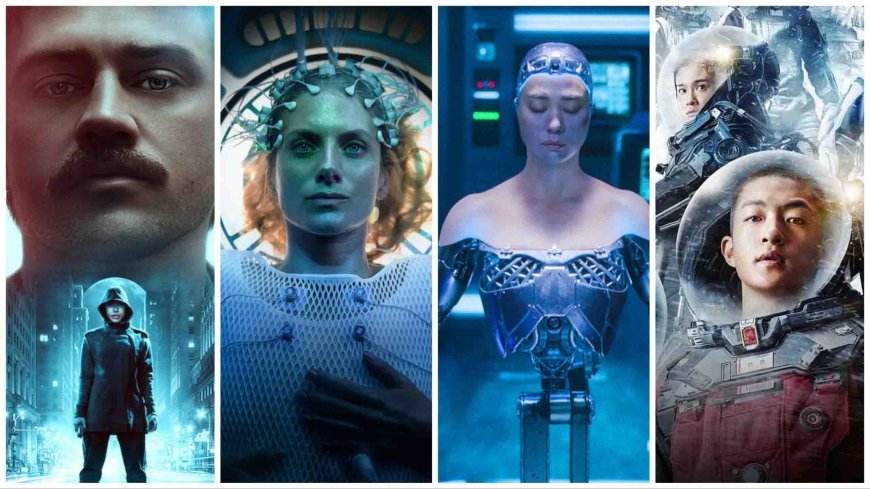Top 10 Sci-Fi Movies That Changed Cinema Forever
Explore 10 groundbreaking sci-fi movies that redefined cinematic storytelling and revolutionized the science fiction genre forever.
Science fiction has always pushed the boundaries of imagination, but some movies have gone beyond entertainment—they’ve revolutionized the film industry itself. These cinematic masterpieces not only captivated audiences but also redefined what science fiction could be. Whether through visual innovation, groundbreaking special effects, or profound philosophical storytelling, these films left an indelible mark on cinema. Here’s a countdown of the top 10 sci-fi movies that truly changed the game.
2001: A Space Odyssey (1968)
Stanley Kubrick’s 2001: A Space Odyssey isn’t just a film—it’s a cinematic experience. Released in 1968, it set the standard for science fiction with its mesmerizing visuals, thought-provoking narrative, and stunning attention to scientific realism. Collaborating with famed author Arthur C. Clarke, Kubrick crafted a story that explores evolution, artificial intelligence, and humanity’s place in the universe.
· Introduced groundbreaking visual effects that were revolutionary for the time
· Explored existential and philosophical themes rarely tackled in sci-fi
· Influenced generations of filmmakers and sci-fi storytellers
Star Wars: A New Hope (1977)
George Lucas's Star Wars didn’t just redefine sci-fi—it created a pop culture phenomenon. Released in 1977, it revolutionized storytelling through a blend of mythological structure, high adventure, and state-of-the-art special effects. With characters like Luke Skywalker and Darth Vader, the film brought space fantasy to the mainstream and gave rise to one of the most successful franchises in history.
· Revolutionized special effects and introduced Industrial Light & Magic
· Set a new benchmark for cinematic world-building
· Introduced merchandising and expanded universes in film
Blade Runner (1982)
Ridley Scott’s Blade Runner brought cyberpunk into the spotlight. Its bleak, dystopian vision of the future, combined with deep philosophical questions about identity, consciousness, and humanity, made it a cult classic. Although it was initially underappreciated, Blade Runner has since become one of the most influential sci-fi films ever made.
· Defined the visual aesthetic of cyberpunk
· Explored artificial intelligence and the ethics of cloning
· Influenced films, anime, video games, and fashion
The Matrix (1999)
The Matrix, directed by the Wachowskis, shook the world of cinema with its innovative storytelling, philosophy, and “bullet time” effects. It challenged viewers’ perceptions of reality and simulated worlds, offering a heady mix of action, philosophy, and groundbreaking visuals. It wasn’t just a film—it became a cultural reset.
· Introduced “bullet time” and revolutionary visual effects
· Combined philosophical depth with blockbuster action
· Influenced fashion, technology, and pop culture
Jurassic Park (1993)
Steven Spielberg's Jurassic Park brought dinosaurs back to life like never before. Using groundbreaking CGI mixed with animatronics, it delivered an awe-inspiring experience that captivated audiences worldwide. It not only pushed the limits of what visual effects could achieve but also redefined summer blockbusters.
· First major film to use realistic CGI creatures
· Blended action, suspense, and science seamlessly
· Revolutionized the use of sound design and animatronics
Inception (2010)
Christopher Nolan’s Inception challenged conventional storytelling with its layered dreams and time manipulation. It blurred the line between science fiction and psychological thriller, offering audiences a puzzle box of narrative depth and spectacular visuals. Nolan’s ability to marry intellectual complexity with blockbuster entertainment set a new standard.
· Explored the concept of shared dream worlds
· Used practical effects for impossible visuals (e.g., rotating hallway)
· Inspired debates and fan theories around the ending
Alien (1979)
Ridley Scott’s Alien fused horror and science fiction in a way never seen before. With its claustrophobic tension and iconic monster design by H.R. Giger, the film redefined the genre. Ellen Ripley, played by Sigourney Weaver, also became a trailblazer for strong female protagonists in action films.
· Introduced sci-fi horror as a legitimate genre
· Gave rise to one of the most iconic creatures in film history
· Elevated female leads in action and science fiction
Terminator 2: Judgment Day (1991)
James Cameron’s Terminator 2 was not just a sequel—it was a leap forward in film technology. With revolutionary CGI, complex characters, and a gripping storyline, it deepened the emotional impact of science fiction while delivering explosive action. It redefined what sequels and sci-fi action films could be.
· Pioneered use of liquid metal CGI effects
· Humanized the machine in a powerful character arc
· Blended spectacle with emotional storytelling
Metropolis (1927)
Fritz Lang’s Metropolis was a silent film that laid the foundation for modern science fiction. Released in 1927, its depiction of a futuristic dystopia, class divide, and artificial humans was decades ahead of its time. Despite being nearly a century old, it remains visually striking and narratively relevant.
· One of the first full-length science fiction films
· Introduced visual motifs still used today in sci-fi
· Influenced films like Blade Runner and The Fifth Element
Interstellar (2014)
Christopher Nolan’s Interstellar took viewers on a breathtaking journey through space and time. Based on real astrophysical theories and developed with the help of scientist Kip Thorne, the film blends emotional storytelling with hard science. Its stunning visuals and powerful themes make it a standout of the 21st century.
· Accurately visualized black holes and time dilation
· Explored love, sacrifice, and survival through a scientific lens
· Merged science fiction with deeply human drama
Conclusion
Science fiction is more than just spaceships and aliens—it’s a mirror that reflects our hopes, fears, and dreams. The ten films listed above didn’t just entertain—they shifted paradigms, introduced revolutionary ideas, and forever changed how cinema tells futuristic tales. These are the films every sci-fi enthusiast should watch, study, and revisit time and again.
What's Your Reaction?








